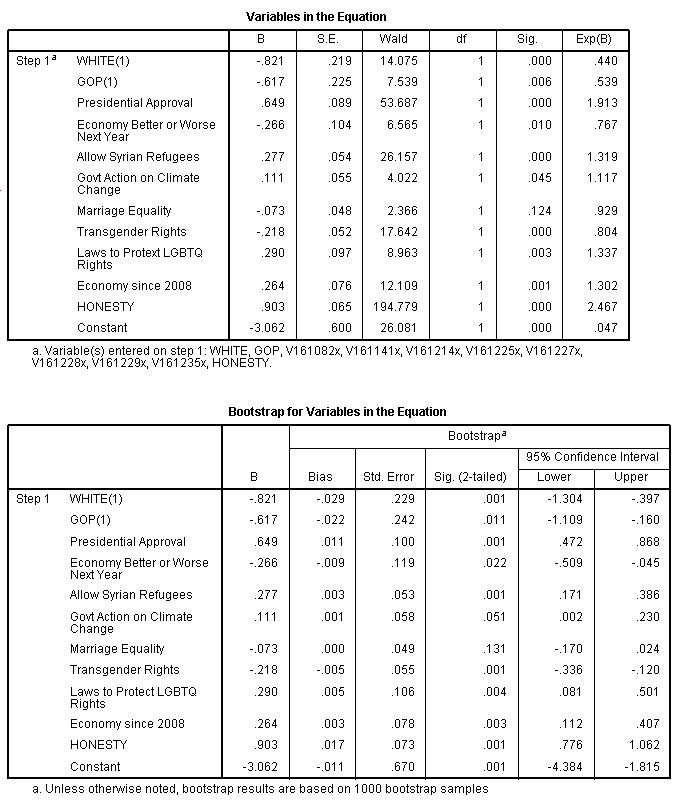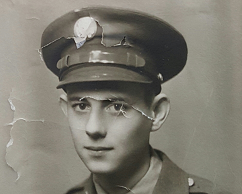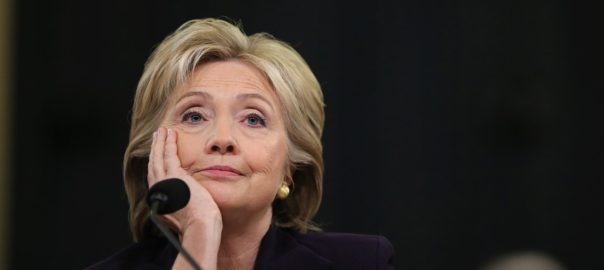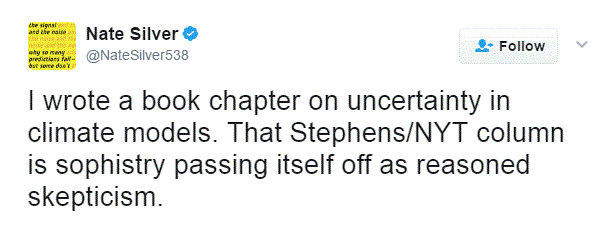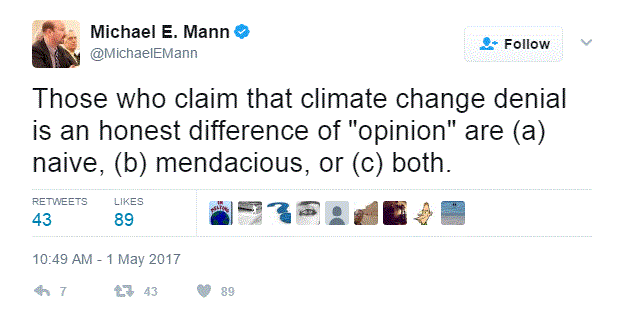By Kent R. Kroeger (Source: NuQum.com, May 5, 2017)
Heading into Mother’s Day weekend, I intended to write about my 86-year-old mother, a retired Iowa public school teacher and a great lady.
But…it will need to wait, as I’ve been thinking a lot about my father recently…and Donald Trump.
President Trump’s recent SiriusXM Radio interview triggered my latest reflection. This is the interview where President Trump wondered out loud, “Why was there a Civil War?” According to Trump, President Andrew Jackson would have found a way to avoid the Civil War if he had been around near its start. I’m being charitable in my interpretation of the Trump’s comments.
Link: Trump Speaks About Andrew Jackson and the Civil War on SIRUSXM Radio
I don’t know how I made it a week before hearing the SiriusXM Radio interview. But, I did — until a former colleague sent it to me.
“This is your president,” she wrote. “Enjoy.”
Full disclosure. I am a Obama-Trump voter (and I caucused for O’Malley). The New York Times, among others, have concluded that the shift of people like me from Obama (in 2012) to Trump (in 2016) explains much of why Clinton lost what was considered a very winnable race for her.
Click here to read Global Strategy Group’s Matt Canter give a more substantial understanding of this shift from Obama to Trump.
Suffice it to say, I had my reasons (such as her aggressive support of a reckless, neocon-inspired foreign policies) and nothing has changed to make me regret my vote. I share actor James Woods’ sentiments on the 2016 election ==> here:
But the Trump interview on SiriusXM was unsettling, nonetheless. He mangled history in a way that would have made my father cringe. It should stagger anyone that values rational thought.
Historical events and figures can have varying interpretations depending on the historian. However, there are socially accepted boundaries that generally limit where insightful historical analyses can tread. This engenders an intellectual elitism found with most academic historians — but for that modest cost — we, as a society, gain a common understanding of our culture, our nation and ourselves.
Donald Trump wandered into an uncommon place — and it was built from his own synaptic impulses that don’t always serve him well. In the SirusXM interview he offered a nonsensical description of an interesting American political figure (Andrew Jackson) and clumsily tried to pivot into an understanding of the Civil War.
It sounded like something Steve Bannon dreamed up and Trump tried to regurgitate, as best he could, close to its original form.
The attempt failed.
And after hearing the SiriusXM interview, that’s when I thought of my father, Glenn Kroeger.
Though trained as a physicist and engineer, he was an historian at heart. He loved history more than the profession that helped him build a home, raise a family and comfortably retire before his death in 2001.
Growing up in the Great Depression, history books were his escape from the soul-grinding realities of eastern Colorado in the early 1930s. And unlike our current president, my father cared about how historical knowledge was conveyed. Verbal Incoherence suggests laziness and insults the listener.
My father was trained in math and science. H expressed history as would a mathematician who put a premium on causal ordering and trends. His dinner table dissertations on history didn’t just retell stories, but were interlaced with causal explanations.
His over-arching causal model was a simple one. While often riddled with ignorance, suffering and death, my father saw history as the near monotonic march of progress. The arc of human achievement was an upward trending line with occasional perturbations followed by a regression back to the mean and a return to the onward march of progress.
His optimism mirrored the views at the time of Austrian economist Joseph Schumpeter, who coined the term “creative destruction” when describing capitalism’s role in advancing society. For someone growing up in deep poverty in the rural plains in the 1930s, my father’s attraction to such a deterministic perspective was understandable. It became part of his political DNA, even as his immediate views on contemporary political issues were often shifting and malleable.
In sharing his love of history with me, my father would often return to what I call his origin stories. These were the historical figures and events from which his personal life philosophy arose.
He talked so often of Genghis Khan, Thomas Paine, Thomas Jefferson, Abraham Lincoln, Otto von Bismarck, Teddy Roosevelt, FDR, and General George Marshall, I thought they were blood relations. (They weren’t.)
He talked with awe about the rise of Genghis Khan and how his Mongolian horse archers conquered nearly all of continental Asia, the Middle East and parts of eastern Europe. His descriptions of how Genghis Khan’s army vanquished great cities were so vivid, I thought perhaps he lived through it. (He didn’t.)
My father’s paperback copies of Thomas Paine’s “Common Sense” and “The Age of Reason” were so greasy and feathered, I always intended to buy him new, hard bound copies before he died. (I didn’t.)
You knew not to say the name, John D. Rockefeller Jr., in my father’s presence. Growing up poor in Sterling, Colorado in the 1930s meant you knew chapter and verse how Rockefeller, the Colorado Fuel and Iron Company, and their hired goons brutally ended a miners strike in the town of Ludlow. To end the strike, two dozen people died on April 20, 1914, including some women and children. It was one of my father’s origin stories even though neither he, nor anyone from our family, was directly involved.
There were other dinner table stories I will always remember.
He never forgave Captain Smith for the arrogance that precipitated his driving the Titanic into a rogue iceberg in the north Atlantic. When he would describe in detail how the ‘steerage class’ were prevented from reaching the lifeboats, I can be forgiven if I once believed he was one of the Titanic‘s few third class passengers to make it to the Carpathia.
My father loathed inherited wealth and he used the Titanic story as an exemplar tale. When the richest man in America at the time, John Jacob Astor IV, was found dead in the water by one of the returning lifeboats, my father’s regret was that he didn’t sink to the bottom of the icy Atlantic.
My father’s opinions often lacked gentility. They were sometimes as dry and harsh as the tumbleweed that would sweep through eastern Colorado in the dust bowl years. He would often punctuate political discussions with the question, “Who benefits and who loses?” Years later, in college, I would read Howard Zinn’s, “The People’s History of the United States,” and think, this sounds familiar.
Would you be the savior of the broken, the beaten and the damned? is a line from one of my favorite bands is also a nice summary of my father’s philosophy.
But my father wasn’t a socialist, but close. He was a Democrat, and though he opposed his party on some of its biggest issues (Equal Rights Amendment, busing, taxes, affirmative action, Middle East policy), he despised the Republicans too much to ever consider changing his party registration. He was a disgruntled Democrat to his end.
He joined the U.S. Army near the end of World War II when he was 16-years-old, doctoring his birth certificate to make it look like he was 17. And while he lamented the war ended before he could really participate, I always thought it seemed like the perfect time to join.
He would express to me his admiration for what he called the “Big Three” U.S. Army Generals: Marshall, Bradley, and Eisenhower. Due to his older brother’s immense suffering in the war’s Pacific theater, he despised Generals MacArthur and LeMay.
But his deepest animus was towards Harry “ass” Truman, often talking about his approving the needless dropping of the atomic bombs on Japanese civilians in World War II and suggesting he along with LeMay should have been included in the war crime trials after the war.
At the same time, he thought the Western allies should have pushed Stalin out of eastern Europe. While some liberals at the time were expressing admiration for the Russian dictator, my father saw just another example of power elites taking advantage of the common people.
Until his death, my father also blamed Truman for starting the fire that today keeps the U.S. in a near-permanent state of war in the Middle East. At the end of World War II, he didn’t understand why Truman didn’t allow more Jewish refugees into this country. When Truman championed the creation of Israel, my father lamented his callousness in turning a blind eye to the Palestinian people when they were driven from their homes and cities during Israel’s creation.
Over his views on the Palestinians and Israel, some of my father’s friends from the Unitarian Church that we attended would call him an ‘anti-Semite’ behind his back. From that experience I learned the treacherous ease with which liberals like to label others as’racist.’
My father was many things — not all of them admirable. But he was not a racist. Far from it. Rather, everything he read and experienced passed through historical lenses more sensitized to class and economics than to issues of race and ethnicity. When identify politics took over the Democratic Party in the 1960s and 70s, he knew his party had left him for good. All too familiar under present circumstances.
But my father didn’t hate all politicians. He loved FDR and Ike and cried like a grieving brother when JFK died. {But, Dad, didn’t you often call the Kennedy family a ‘bunch of bootleggers and smugglers’ that can’t be trusted? I would learn years later about how some people are good at compartmentalizing their opinions.}
However, his thoughts towards LBJ and Nixon were consistent and mostly negative.
As for Reagan, my father saw him as a puppet to Republican elites; though, when Reagan took down the PATCO union, my father would say it was about time someone stood up to the powerful unions. This coming from a man that would almost cry relating the story of the Ludlow massacre. This disconnect did not go unnoticed, even by my father, who admitted to me that 20 years in the white collar world as an engineer had changed his views on a lot of things. This is why I laugh when political analysts tell us that the Millennials will put and keep the Democrats in power for a long time. Yeah, right. Lets see how that turns out.
As he aged, my father became particularly sensitive to politicians’ honesty. He was convinced they would conspire to steal his Social Security and retirement nest egg. He was especially distrustful of Bill Clinton — and Clinton didn’t disappoint. Regarding the ‘the kid from Hope, Arkansas,’ he would say, “he tells lies even when the truth would sound better.”
He despised Bill, but admired his wife.
Yes, it is hard for me to fit my father’s politics or general philosophy to any coherent governing framework. It covered a lot of ideological territory.
My father’s egalitarianism was non-doctrinaire and elastic, for while history taught him that concentrated wealth hindered the general prosperity of a nation, he also recognized some people are endowed with great ideas and should be encouraged to enjoy the fruits of those inspirations. Hence, even though he admired FDR and the New Deal, by the 1970s he thought the U.S. government had evolved into a tool for laggards, the envious and the over-educated to take away other people’s hard work.
My father was a textbook Reagan Democrat except that, as I mentioned, he despised the Republicans – and, yet, still voted for Ike twice, and Nixon and Ford once each.
The lesson here? If you assume someone will vote one way because of their identify or past voting history, you do so at the risk of being wrong…very wrong.
Today, I still find myself drawing chestnuts of wisdom from one of my father’s political rants. He was driven by his childhood traumas and adult insecurities more than from a tight political ideology. That’s OK. Cognitive dissonance never bothered him. He swam in it. As we all do. As Donald Trump seems to do with relish.
By writing about my father here, perhaps I now see Trump in a more understanding light?
Uh….no.
Donald Trump talks about history like someone who had no time for it when he was still a student. His historical musings are devoid of substance, depth, and utility. Its a nutrition-free gruel of superficial knowledge held together with stunted syntax and sudden pauses, all meant to convey to the listener that its chef is a really, really, really smart guy. Of course, it does the exact the opposite — and I think he knows it.
I see the embarrassment in his face sometimes as it turns increasingly red the more he talks. In those moments he is showing the physiological attributes of chronic embarrassment – not dementia or narcissistic personality disorder as many want to believe. Donald Trump is painfully aware of his severe knowledge deficit.
I genuinely believe Donald Trump sits up at night kicking himself for all the stupid things he said during the day. By 3 a.m., that regret and embarrassment turns into anger — and then we get the tweets. Loads of tweets.
To be fair, my father also had some quirky interpretations of history (such as, ‘the Germans nearly won World War II’). But even when my father was wrong, it was rooted in a common reality that anyone could at least understand, if not share agreement.
My father said history mirrored the massive rivers that cut through the plains he grew up on. From a surface view, the North Platte River often meanders in inexplicable directions, snaking across the prairie like a rattlesnake. But from a much higher perspective, the river churns through our nation’s midsection with the clear purpose of finding the nearest ocean.
But where rivers seek the geographic low point, my father saw human history as driven by a different but equally deterministic dynamic. In the immediate, it is full of strange cul-de-sacs that defy explanation — but over the long arc of time it reveals its larger mission. Collectively, we humans always seek the next highest point. And from there, the next, and then the next. We can’t help ourselves.
That was how my father came to understand history. His views are never far from my thoughts.
[Mom, I will write about you on Father’s Day, I promise]
The author can be reached at: kentkroeger3@gmail.com
About the author: Kent Kroeger is a writer and statistical consultant with over 30 -years experience measuring and analyzing public opinion for public and private sector clients. He holds a B.S. degree in Journalism/Political Science from The University of Iowa, and an M.A. in Quantitative Methods from Columbia University (New York, NY). He lives in Ewing, New Jersey with his wife and son.



